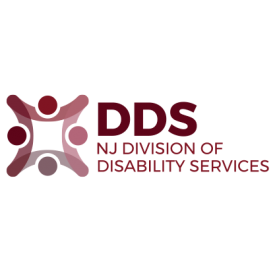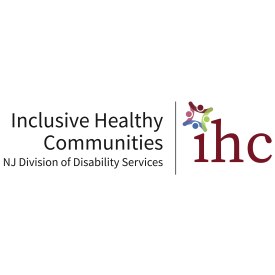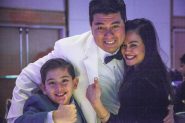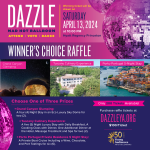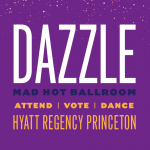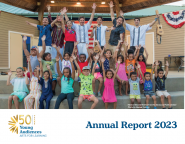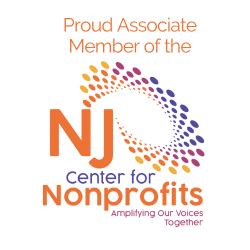Using the Arts to Advance Disability Equity
YA is delivering United We Discover, a series of assemblies, professional learning, and workshops that are dedicated to increasing positive perceptions of Disabled identities while also increasing equitable educational arts experiences in schools.
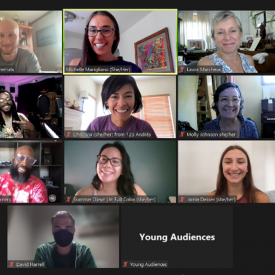
10 Young Audiences United We Create program designers smile as they gather in a zoom meeting.
Young Audiences Arts for Learning New Jersey & Eastern Pennsylvania (YA) is delivering United We Discover, a series of assemblies, professional learning, and workshops that are dedicated to increasing positive perceptions of Disabled identities while also increasing equitable educational arts experiences in schools. Our Inclusive Health Communities grant goal is to work with five school partners to build connected communities, where teachers, students and families experience a variety of school-based arts programs designed to foster respect, understanding, and connection.
In August 2022, Disabled and non-disabled teaching artists who provide programs for YA gathered to share ideas for how arts experiences can nurture positive perceptions of Disability, as well as foster a sense of belonging and creative expression for students who receive Individualized Educational Plan (IEP) services. Everyone agreed that meeting all students where they are, as well as uplifting different modes of engagement and collaboration would be critical to successful program design and implementation. The Latin Grammy Awards winner Christina Sanabria from 1,2,3 Andrés shared that the use of American Sign Language (ASL) in the YA assembly Actívate would offer audiences an opportunity to become familiar with ASL, while also honoring gestural and facial communication.
With United We Discover programming currently in its third month of implementation, we are starting to understand how arts experiences are helping educational leaders and teachers expand possibilities and establish systems of supports within school culture and classroom practice. Vice Principal Rasheedah Saleem-Muhammad from McKinley School shared that, “One of the most significant things we learned during the United We Discover Assembly programs by David Harrell and Bomani is that our learners can do anything they want. Life has endless possibilities.” Vice Principal Muhammad’s reflection reminds the reader that when school communities engage with positive perceptions of Disability, we are working to offer systems that emphasis inclusion and disrupt mainstream, ableist accounts and viewpoints of Disability.
Live music, dance, and theatre activates our brains and bodies and stimulates our senses in ways that lead to increased engagement and connection. To date, all five participating schools have experienced two Young Audiences assemblies and four schools have 7-10 day residencies taking place. Principal Violet Robinson from Paul Robeson Community School for the Arts shared that “The United We Discover programming has made it possible for my students to experience inclusivity in a way that is meaningful. After a resident artist visit or an assembly, students stop and engage me in conversations about acceptance. Without a doubt, my students have learned that ‘Our differences make us special!’” Research shows that participation in the arts provides alternative approaches to learning and engagement for Disabled students. “Miss Melissa Jaikissoon a PreK teacher from Anna Iandoli Early Learning Center shared “After my students worked with Young Audiences teaching artist Laura Marchese, I noticed how attentive and engaged they were to continue the learning experience. So, my instructional assistant and I extended the activity by working on following directions and understanding spatial relationships (positional words). For example: “Let’s put our hands up”; “Let’s put our hands down”; “Where is the bear? It’s UNDER my chair.”
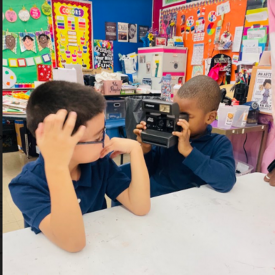
In a grade 1 art classroom, a male student positions a Polaroid camera to his eye as he takes a photo of a male classmate seated at a table.
Teaching artist Erik James Montgomery is collaborating with teachers and students at Salome Ureña Elementary School to explore the skills and knowledge of photography. Through his program, students become acquainted with the history of photography as they examine cameras used in different eras.
This experience encourages students to discover how light determines the brightness and darkness of a photo. With their newly found understanding of photography students are currently working on creating selfies. The school’s visual arts teacher Dawn Maglio shared, “Exploring the art of photography is helping our students who receive IEP services to experience the arts in new ways. Students have explored a variety of cameras and how they work, created light paintings, and have even taken photographs of each other. Students are engaged, interacting, and showing so much excitement when Mr. Erik arrives with his bag of goodies! So far, they love taking ‘selfies’ the best!”
Teaching artist Steve “Believe” Lunger from Hip Hop Fundamentals is collaborating with teachers and students at Paterson School 15 to explore how Hip Hop Dance is an embodiment of community belonging. In Steve’s program, students are challenged to reimagine themselves through an exploration of Hip Hop dance, fashion, and music and by connecting this exploration to their own lives, cultures, and influences. All three participating teachers shared, “Our team is grateful for this experience to work with Steve Believe. Our students love and enjoy when he works with them. Steve uses visuals, models, and provides them with the history of Hip Hop. They learn new moves each week and practice daily. We can’t thank Young Audiences and the Inclusive Healthy Communities grant enough. What a great experience for all!”
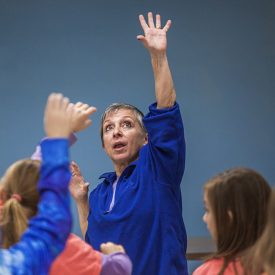
Photo of Laura Marchese by Frank Veronsky
Teaching artist Laura Marchese is collaborating with teachers and students at Anna Iandoli Early Learning Center to use dance as an expression to transform details from a selection of Disability forward children’s books. We have created the United We Discover Library Collection as a resource for school partners, educators and family members to engage with selected Disability forward texts and resources. We invite you to identify a title from the United We Discover Library Collection and share it with someone you love! Your sharing will help us work in solidarity with Disability justice leaders to uplift positive perceptions of Disability.
Teaching artist Summer Dawn is collaborating with teachers and students at Paul Robeson Community School for the Arts to build stories. Participants used imaginary play to identify the internal and external character traits of superheroes and villains. Next, they used their imagination to identify and transform aspects of superhero stories into stories of their own. Participants worked together to identify an everyday problem and how their collective strengths and weakness impact the problem’s solution. Grade 1 self-contained classroom teacher Mrs. Coates shared, “My students look forward to Miss Summer coming to the classroom. We have included stories during our Social Emotional Learning activities that correlate with Miss Summer’s activities.”
“Young Audiences has made an organization-wide commitment to equity and inclusivity in our programming, through our DEIA efforts. The partnership and collaboration in these programs are an example of how our students benefit when we work together with shared creativity and vision for inclusive arts education,” states Mikaela Levons, YA Vice Chair and Co-Chair of Arts United (DEIA) Committee.
As a catalyst to advance inclusive arts experiences within and amongst Disabled and non-disabled students the above examples of participatory art making create the time and space for students to use the creative process to transform their lived experiences into original expressions. Thanks to the Inclusive Healthy Communities grant, the mission of Young Audiences to inspire young people and expand their learning through the arts continues to grow and expand.
This initiative was funded (or funded in part) by an Inclusive Healthy Communities Grant from the Division of Disability Services, New Jersey Department of Human Services
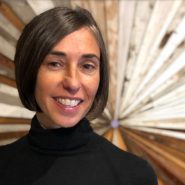
Michelle Marigliano
Young Audiences Director of Curriculum, Instruction & Assessment

